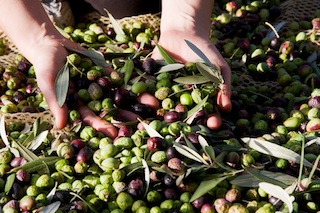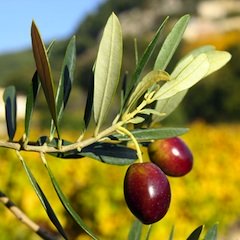The Making of Olive Oil

The harvesting of the raw olives and making of olive oil are performed in accordance to longstanding traditions aimed at producing the highest possible quality of olive oil.
The olives are traditionally hand-picked and harvested at a precise time. Early harvested olives produce a full-flavored, spicy oil, while mid harvested olives deliver a more fruity, deep flavor. Lastly, late harvested olives result in a sweeter, more delicate taste.
Once hand-picked, the olives are brought to a conveyor, which takes them to a washing station to then be crushed into a paste. It's critically important that the olives be crushed as quickly as possible once harvested, and that the crushing be done "gently" to preserve all the flavors.
The paste is then spun in a centrifuge, to allow the olive oil to separate from the water and the vegetable paste. The latter is used as fertilizer, animal feed or compost.
Another technique, instead of spinning, is to cold-press the paste in a certain way to separate the oil from the residue.
The oil is then stored in a steel tank, where it's left to settle for 4-5 weeks, before being bottled for your consumption. :-)
Interesting note: it takes over 16 pounds of raw olives to generate a single liter of extra-virgin olive oil!
Click here to go to the Home Page

Why is olive oil so good and yet so healthy at the same time?
We're used to having to choose between the two. For example, when we're presented with food that tastes like cardboard but we're told is full of organic, unsweetened fiber. ;-)
Well, olive oil is mostly composed of mono unsaturated
fatty acids. These acids can help lower the risk of heart disease by lowering cholesterol levels. They can
also help normalize blood clotting and be beneficial to blood sugar control (re: diabetes). Olive oil is rich as well in antioxidants and in vitamin E, which are believed to play a role in cancer prevention.
So, enjoy olive oil in its many uses, mainly culinary ... and remember that the secret is to add olive oil to other quality ingredients (e.g. tomatoes, feta, arugula, bocconcini, etc) to end up with absolutely delicious and healthy food!



New! Comments
Have your say about what you just read! Leave me a comment in the box below.